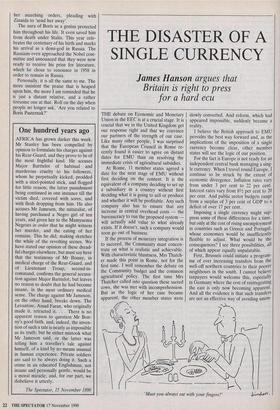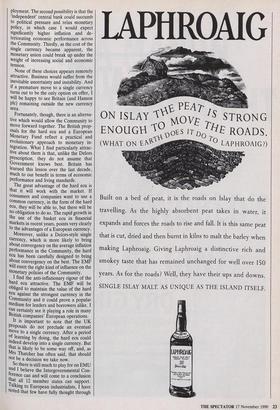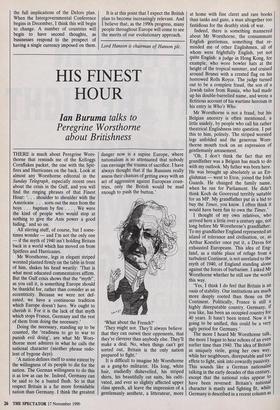THE DISASTER OF A SINGLE CURRENCY
James Hanson argues that
Britain is right to press for a hard ecu
THE debate on Economic and Monetary Union in the EEC is at a crucial stage. It is crucial that we in the United Kingdom get our response right and that we convince our partners of the strength of our case. Like many other people, I was surprised that the European Council in Rome re- cently found it easier to agree on distant dates for EMU than on resolving the immediate crisis of agricultural subsidies.
At Rome, 11 member states agreed a date for the next stage of EMU without first deciding on the content. It is the equivalent of a company deciding to set up a subsidiary in a country without first deciding what it is going to sell or produce and whether it will be profitable. Any such company also has to ensure that any increase in central overhead costs — the bureaucracy to run the proposed system will actually add value to what already exists. If it doesn't, such a company would soon go out of business.
If the process of monetary integration is to succeed, the Community must concen- trate on what is realistic and achievable. With characteristic bluntness, Mrs Thatch- er made this point in Rome, not for the first time. I well remember the debate on the Community budget and the common agricultural policy. The first time Mrs Thatcher called into question these sacred cows, she was met with incomprehension. But as the logic of her case became apparent, the other member states were slowly converted. And reform, which had appeared impossible, suddenly became a reality.
I believe the British approach to EMU provides the best way forward and, as the implications of the imposition of a single currency become clear, other member states will see the logic of our position.
For the fact is Europe is not ready for an independent central bank managing a sing- le currency. When I travel round Europe, I continue to be struck by the extent of economic divergence. Inflation rates vary from under 3 per cent to 22 per cent. Interest rates vary from 81/2 per cent to 20 per cent. And public sector budgets range from a surplus of 3 per cent of GDP to a deficit of over 17 per cent.
Imposing a single currency might sup- press some of these differences for a time, but only at the cost of rising unemployment in countries such as Greece and Portugal, whose economies would be insufficiently flexible to adjust. What would be the consequences? I see three possibilities, all of which appear equally unpalatable.
First, Brussels could initiate a program- me of ever increasing transfers from the well-off northern countries to their poorer neighbours in the south. I cannot believe taxpayers would welcome this, especially in Germany where the cost of reintegrating the east is only now becoming apparent. And all the evidence is that such transfers are not an effective way of avoiding unem `Must you always eat with your fingers?' ployment. The second possibility is that the `independent' central bank could succumb to political pressure and relax monetary policy, in which case I would expect significantly higher inflation and de- teriorating economic performance across the Community. Thirdly, as the cost of the single currency became apparent, the monetary union could break up under the weight of increasing social and economic tension.
None of these choices appears remotely attractive. Business would suffer from the inevitable uncertainty and instability. And if a premature move to a single currency turns out to be the only option on offer, I will be happy to see Britain (and Hanson plc) remaining outside the new currency area.
Fortunately, though, there is an alterna- tive which would allow the Community to move forward together. The British prop- osals for the hard ecu and a European Monetary Fund reflect a practical and evolutionary approach to monetary in- tegration. What I find particularly attrac- tive about them is that, unlike the Delors prescription, they do not assume that Government knows best. Britain has learned this lesson over the last decade, much to our benefit in terms of economic Performance and living standards. The great advantage of the hard ecu is that it will work with the market. If consumers and companies want to use a common currency, in the form of the hard ecu, they will be able to, but there will be no obligation to do so. The rapid growth in the use of the basket ecu in financial markets in recent years, points very clearly to the advantages of a European currency. Moreover, unlike a Delors-style single currency, which is more likely to bring about convergency on the average inflation Performance in the Community, the hard ecu has been carefully designed to bring about convergency on the best. The EMF will exert the right kind of influence on the monetary policies of the Community. I find the anti-inflationary rigour of the hard ecu attractive. The EMF will be obliged to maintain the value of the hard ecu against the strongest currency in the Community and it could prove a popular medium for lenders and borrowers alike. I can certainly see it playing a role in many British companies' European operations. It is important to note that the UK proposals do not preclude an eventual move to a single currency. After a period of learning by doing, the hard ecu could indeed develop into a single currency. But that is likely to be some way off, and, as Mrs Thatcher has often said, that should not be a decision we take now.
So there is still much to play for on EMU and I believe the Intergovernmental Con- ference can and will come to a conclusion that all 12 member states can support. Talking to European industrialists, I have noted that few have fully thought through the full implications of the Delors plan. When the Intergovernmental Conference begins in December, I think this will begin to change. A number of countries will begin to have second thoughts, as businesses respond to the prospect of having a single currency imposed on them. It is at this point that I expect the British plan to become increasingly relevant. And I believe that, as the 1990s progress, many people throughout Europe will come to see the merits of our evolutionary approach.
Lord Hanson is chairman of Hanson plc.

























































 Previous page
Previous page